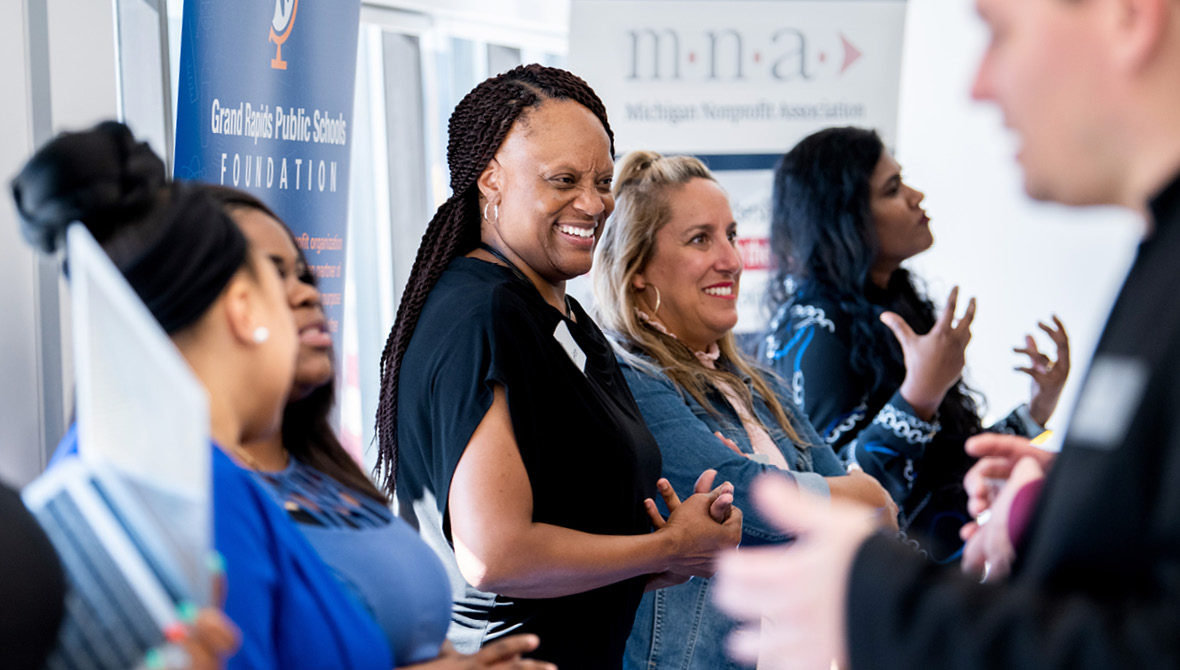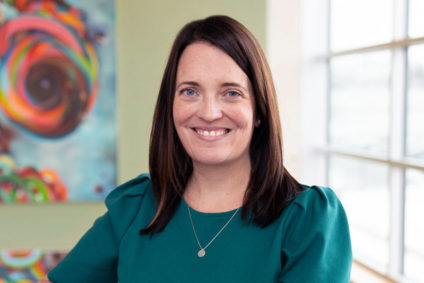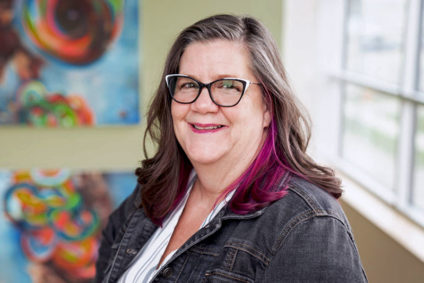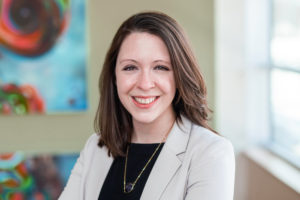Concept to Credential: Advancing Nonprofit Board Leadership Opportunities


It started with a small group asking big questions. Nonprofit executives, funders, and community leaders from West Michigan came together in 2016 to ask how we might rethink the nonprofit board role and processes for greater inclusion, innovation, and community impact. Led by Deb Bailey, former Steelcase executive and Grand Rapids Community College trustee, the Ecosystem for Nonprofit Leadership Project was born.
Designed to equip nonprofit leaders with the skills and tools needed to foster inclusive boardrooms, the project took a community-wide approach to help prepare individuals to serve effectively on boards. Over the course of five years, a committee of more than two dozen local organizations participated in developing a community-based response and solution to this persistent issue, ultimately proposing an ecosystem-based model.
“Over the course of five years, a committee of more than two dozen local organizations participated in developing a community-based response and solution … ultimately proposing an ecosystem-based model.”
Trisector Consulting’s Jill May, a founding committee member, noted her passion for equity and social justice and her interest in incorporating it into the way we work as a key component of this effort. The project came to a celebratory finale at a Nonprofit Board Connect event on August 10, 2022. The work, however, does not stop there.
The project team believed that by equipping organizations and individuals on both sides of the board service experience with knowledge and skills, we could improve the philanthropic sector and the communities we serve. As Tamela Spicer, senior program manager at the Johnson Center and co-chair of the project’s advisory committee, observed at the Nonprofit Board Connect event, “good boards make great nonprofits.”
The Ecosystem for Nonprofit Leadership Project was born from the clear realization that nonprofits in all communities wrestle with diversifying their boardrooms and providing effective experiences for board members. BoardSource’s 2021 report, Leading with Intent, provided insight into the challenges of public charities from across the country, finding that “boards are disconnected from the communities and people they serve.” As the group of leaders discussed challenges with Johnson Center staff, the idea of addressing this as a whole community rather than one organization at a time took shape.
Nonprofits are vital to healthy communities, providing critical services across a broad spectrum of issues, enhancing public life, lifting the voices of marginalized populations, and contributing to the economy. In 2016, nonprofits employed 12.3 million people in the U.S. — a figure that does not capture the tens of millions of additional Americans who volunteered their time with nonprofits as board members, unpaid staff, and service providers.
While competent staff leadership and reliable revenue sources are necessary for nonprofit sustainability, Meehan and Jonker report that “a nonprofit cannot thrive for long without strong board governance.” Strong governance requires diverse community representation. According to a 2019 survey, board members know their board needs to diversify but they don’t have recruiting strategies. By taking straightforward, actionable steps, any board can begin the process of becoming more diverse and inclusive. Advisory committee member Chris Smit, co-executive director for DisArt, noted that boardrooms need to “remain committed to thinking about not only different people but also what you need to do or provide for them to feel empowered to communicate without the panic of trying to please the majority.”
Over the years, the advisory committee reviewed literature, conducted interviews, and shared insights from their own lived experiences. This work helped shape the recently released Nonprofit Competency Model for Inclusive Leadership, a free tool to help align mission-area expertise with role-specific excellence, and the curriculum development for new microcredentials that will launch in 2023.
Carlos Sanchez, co-chair of the advisory committee and director of Ferris State University’s Latino Business and Economic Development Center, noted, “Before the Ecosystem Project, I was looking for a curriculum or product that would help Latino professionals. It didn’t exist, and now it does. Secondary to that, [the sector] keeps talking about the need to diversify boards in a meaningful way, not just in a way that checks the box.”
The Johnson Center has offered a training program, Introduction to Board Service, for new and veteran nonprofit board members for over a decade. The session equips volunteers with an understanding of the nonprofit sector and their legal, fiduciary, and moral responsibilities as board members. The Ecosystem for Nonprofit Leadership project has helped expand this existing work of the Johnson Center to a new competency-based, credentialed curriculum that centers equity in the boardroom and focuses on the interaction between paid/unpaid organization leaders and board members.
“The competency-based, credentialed curriculum … provides new pathways to learn about the sector and prepares volunteers and professionals alike for more effective service.”
This new curriculum is centered on BoardSource’s principles of purpose-driven board leadership and Deloitte Australia’s traits of inclusive leadership, and designed to engage board members and staff leadership (paid or unpaid) in cohort learning to help organizations rethink the board role and processes. The competency-based learning opportunity provides new pathways to learn about the sector and prepares volunteers and professionals alike for more effective service. Those who successfully complete the learning modules will earn a microcredential (or badge) from Grand Valley State University.
The final component of the Ecosystem for Nonprofit Leadership project was an in-person networking session to connect West Michigan nonprofits with board-ready recruits. That hope was realized at the Nonprofit Board Connect event on August 10, 2022.
The members of the project’s advisory committee aspire to have the Nonprofit Board Connect become an annual event to help build boards throughout West Michigan. We agree that this community investment matters for effective boards and nonprofit organizations. While the ecosystem project itself is sunsetting, the work continues through the Johnson Center’s learning services programming and in boardrooms across our community. To dream together about opportunities for future Nonprofit Board Connect events and the support available through learning services, contact Mandy Sharp Eizinger.
As the work of building stronger boards shifts into a new phase, we want to recognize the time, talent, treasure, ties, and testimony of:
In addition, we extend our thanks to these Johnson Center team members for their work on the project:
For more information on badge offerings for Nonprofit Board Leadership, contact Tamela Spicer or Mandy Sharp Eizinger.


